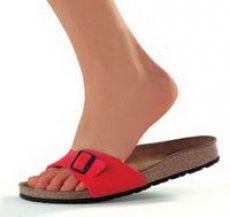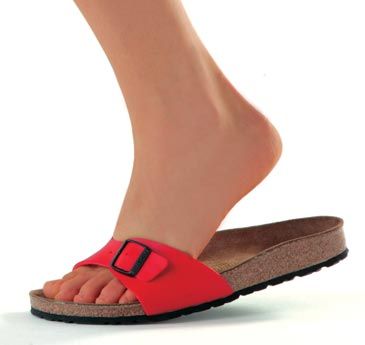Medical expert of the article
New publications
Purpose of orthopedic shoes
Last reviewed: 04.07.2025

All iLive content is medically reviewed or fact checked to ensure as much factual accuracy as possible.
We have strict sourcing guidelines and only link to reputable media sites, academic research institutions and, whenever possible, medically peer reviewed studies. Note that the numbers in parentheses ([1], [2], etc.) are clickable links to these studies.
If you feel that any of our content is inaccurate, out-of-date, or otherwise questionable, please select it and press Ctrl + Enter.

The purpose of orthopedic shoes is not only their convenience. They are also intended for treatment, gait alignment, and much more. Orthopedic shoes and orthopedic shoe insoles can be recommended by an orthopedic doctor. Orthopedic shoes can be purchased in special shoe stores or ordered from an orthopedic department - and orthopedic insoles will be made for you in 20 minutes exactly to fit your foot. Let's take a closer look at why you need orthopedic shoes.

Alignment of bones and joints
Orthopedic shoes can help to properly position the joints of the feet, especially during physical exercise or while playing professional sports.
Damping (cushioning)
Your feet can feel much better when you run, walk, or jump in orthopedic shoes. They soften the shock, spring well, and give you a feeling of comfort and strength.
Gait
Your gait can be significantly improved by simply wearing orthopedic shoes. If you also do special exercises to improve your gait, the result will please not only you, but also those around you.
Increased activity
You can achieve higher sports results by wearing orthopedic shoes. They greatly increase the range of motion and flexibility of the legs. In such shoes, doing sports or even just running is a pleasure. After that, a person somehow imperceptibly begins to strive for better sports results.
Leg protection
Wearing orthopedic shoes can protect the joints of the legs, as well as the knees and hips. This result is quite achievable due to the correctly selected shoe last, insoles and lacing, as well as the material from which the orthopedic shoes are made. It should be breathable leather or special breathable fabric.
Arch support
Orthotics and orthotics can provide better arch support than regular shoes, which can't provide that support, leaving you feeling tired throughout the day. Arch support can reduce the risk of conditions like plantar fasciitis and tendonitis.
For what diseases are orthopedic shoes recommended?
Orthopedic shoes can reduce the risk of many diseases or conditions, including the risk of their development or recurrence of symptoms.
- Flat feet - transverse or longitudinal
- Fingers that are called hammer toes
- Metatarsal bones with protrusion of heads
- Heel spurs, bunions or calluses with corns
- Feet of different sizes
- Swelling of the legs
- Varicose veins
- Clubfoot
- Pain when walking
- Diabetes
- Recovery from fractures and leg injuries
Tips for those who buy orthopedic shoes
Orthopedic shoes for people with sore feet are designed to prevent excessive stress and inflammation of the joints. When you go to buy orthopedic shoes, follow these simple tips
- Buy shoes or boots one size larger if you have bunions (hallux valgus)
- Choose shoes that fit the larger foot (it's no secret that many people have different sizes of right and left feet). Additional space can be adjusted by adjusting the size of the insole.
- Try on orthopedic shoes at the end of the day because feet tend to swell.
- In addition to orthopedic shoes, order or buy orthopedic insoles. This will ensure proper distribution of body weight and make it possible to feel more comfortable when walking.
- Do not buy shoes with heels higher than 4 centimeters (this applies more to women who love high heels).
- Choose orthopedic shoes according to the width of your foot; narrower shoes can cause calluses and corns.
- Avoid shoes where your big toe is pushed into the toe. This can cause joint inflammation.
Orthopedic shoes, if chosen correctly, can significantly improve the quality of your life.

